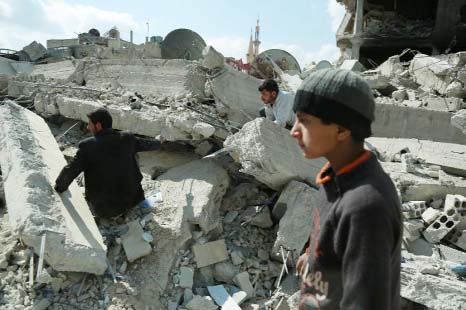
AFP, Syria :
Civilians in Syria’s Eastern Ghouta shunned Russia’s offer to quit the besieged enclave for a second day on Wednesday, as rebels and Moscow blamed each other for the humanitarian deadlock.
The bombardment that killed 600 civilians in 10 days has quietened since the Kremlin ordered a daily “humanitarian pause”, but not one of the battered region’s 400,000 residents left to board buses provided by the regime.
AFP reporters saw no movement at the Wafideen checkpoint through which would-be evacuees were told to exit the Eastern Ghouta enclave that the government lost in 2012 and has besieged almost ever since.
“The humanitarian corridor is open to all those who wish to return to the fold of the homeland, but so far nobody came and this is the second day,” said a military officer at the checkpoint.
Regime-backer Russia on Monday announced five-hour halts in the bombardment of the enclave and said it was guaranteeing civilians safe passage to flee.
The move fell far short of a full ceasefire voted for by the United Nations Security Council – but was still welcomed inside the enclave as some respite from one of the bloodiest assaults in Syria’s seven-year-old war.
Despite the step, the UN demanded that all sides must implement the total truce approved on Saturday, and said some 40 trucks loaded with aid were waiting for the violence to stop.
Moscow’s “humanitarian pause” echoes a similar tactic employed by Russia and the Syrian regime as they looked to force rebels out of second city Aleppo during a ferocious 2016 battle. No casualties at all were reported when Wednesday’s window closed at 2:00 pm (1200 GMT) but warplanes were back in the sky moments later.
“During the truce, the ceasefire is almost enforced,” said Syrian Observatory for Human Rights head Rami Abdel Rahman, adding that nine civilians were killed in strikes before and after on Wednesday. The first five-hour “pause” on Tuesday passed with only two killed in regime bombardment, according to the Britain-based war monitor.
The Syrian regime has accused the terrorist groups inside Ghouta of sabotaging the initiative by shelling the designated humanitarian corridors to hold civilians as human shields.
“The terrorists are impeding those who want to cross, either by putting pressure on them or by firing on the humanitarian corridors,” the military officer said, speaking on condition of anonymity.
Civilians in Syria’s Eastern Ghouta shunned Russia’s offer to quit the besieged enclave for a second day on Wednesday, as rebels and Moscow blamed each other for the humanitarian deadlock.
The bombardment that killed 600 civilians in 10 days has quietened since the Kremlin ordered a daily “humanitarian pause”, but not one of the battered region’s 400,000 residents left to board buses provided by the regime.
AFP reporters saw no movement at the Wafideen checkpoint through which would-be evacuees were told to exit the Eastern Ghouta enclave that the government lost in 2012 and has besieged almost ever since.
“The humanitarian corridor is open to all those who wish to return to the fold of the homeland, but so far nobody came and this is the second day,” said a military officer at the checkpoint.
Regime-backer Russia on Monday announced five-hour halts in the bombardment of the enclave and said it was guaranteeing civilians safe passage to flee.
The move fell far short of a full ceasefire voted for by the United Nations Security Council – but was still welcomed inside the enclave as some respite from one of the bloodiest assaults in Syria’s seven-year-old war.
Despite the step, the UN demanded that all sides must implement the total truce approved on Saturday, and said some 40 trucks loaded with aid were waiting for the violence to stop.
Moscow’s “humanitarian pause” echoes a similar tactic employed by Russia and the Syrian regime as they looked to force rebels out of second city Aleppo during a ferocious 2016 battle. No casualties at all were reported when Wednesday’s window closed at 2:00 pm (1200 GMT) but warplanes were back in the sky moments later.
“During the truce, the ceasefire is almost enforced,” said Syrian Observatory for Human Rights head Rami Abdel Rahman, adding that nine civilians were killed in strikes before and after on Wednesday. The first five-hour “pause” on Tuesday passed with only two killed in regime bombardment, according to the Britain-based war monitor.
The Syrian regime has accused the terrorist groups inside Ghouta of sabotaging the initiative by shelling the designated humanitarian corridors to hold civilians as human shields.
“The terrorists are impeding those who want to cross, either by putting pressure on them or by firing on the humanitarian corridors,” the military officer said, speaking on condition of anonymity.

